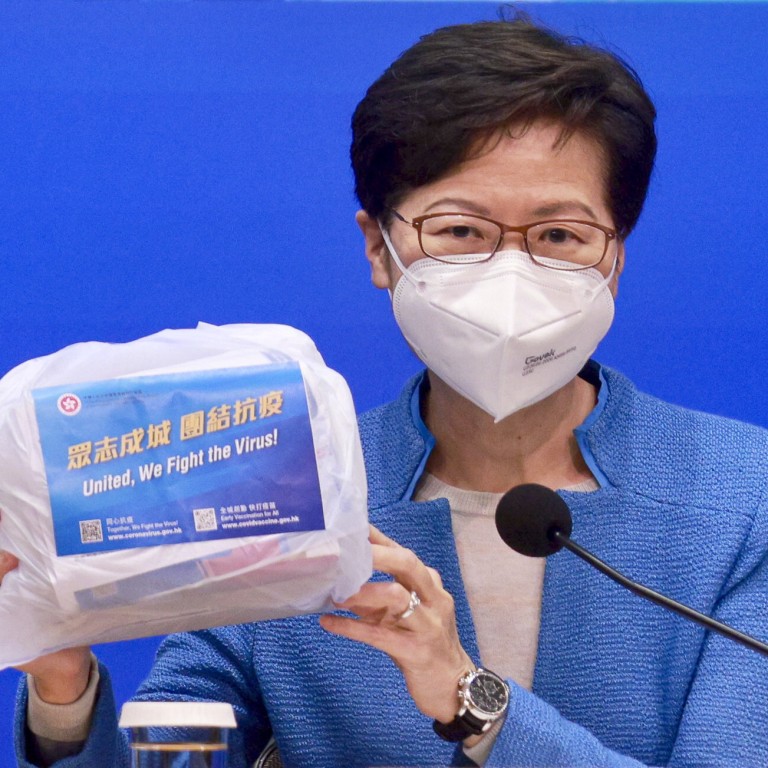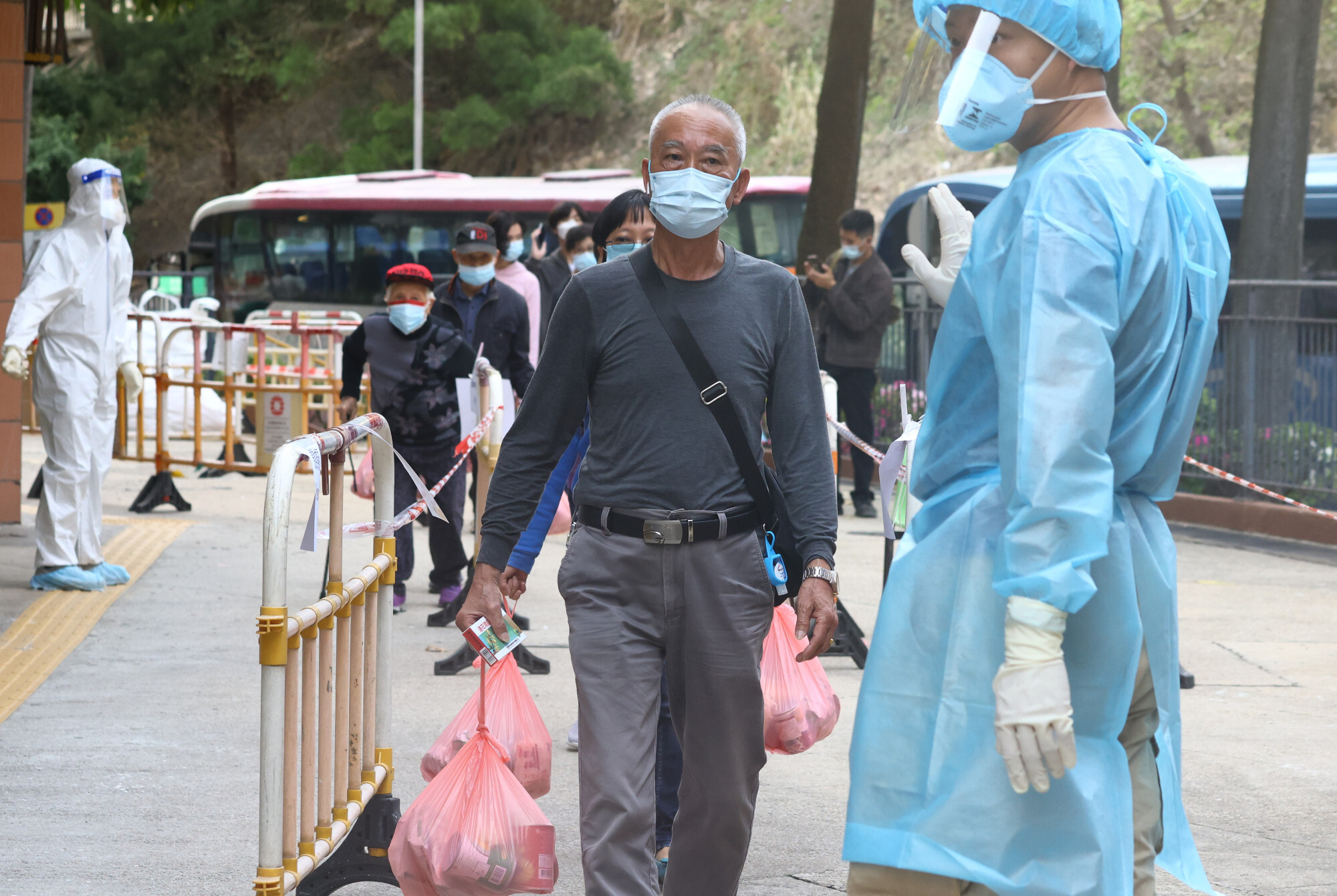
Coronavirus Hong Kong: authorities to distribute kits with rapid tests, KN95 masks to 3 million households starting next month, as deaths fall to 3-week low
- Each kit will include 20 KN95 masks, 20 rapid tests and two boxes of proprietary traditional Chinese medicine, among other items
- Authorities plan to distribute them within one week early next month, and larger households will be eligible for more than one
Chief Executive Carrie Lam Cheng Yuet-ngor on Friday also said the government was open to the idea of giving part of its stockpile of oral antivirals to private clinics, which would join private hospitals in distributing the pills to infected residents.
According to Lam, each kit will include 20 masks, 20 rapid tests, two boxes of proprietary traditional Chinese medicine, a pamphlet from the Centre for Health Protection (CHP) and a greeting card to encourage residents to keep up the fight against the fifth wave of Covid-19 infections.
“As our medical supplies are now sufficient, we will go for a wider and more organised distribution of those resources,” she said.
Hong Kong confirmed 10,405 new Covid-19 cases on Friday, the fewest since February 25, when 10,010 cases were logged. Authorities also reported 192 deaths, including 30 backlogged ones.
The announced fatalities marked the first time the number had fallen below 200 since March 4, when 188 were reported. The city’s tally of confirmed cases stood at 1,111,629, with 6,962 related deaths.
On the back of the falling number of cases, the government announced that departments would gradually resume public services this coming Friday with the aim of returning to normal levels by April 21.
More than 10,000 volunteers and civil servants will be mobilised to help pack the new supply kits starting next Wednesday, according to Jack Chan Jick-chi, acting secretary for home affairs.
Authorities plan to distribute the kits within a week early next month and larger households, consisting of seven or eight people, will be eligible for more than one.

Chan said the Housing Department would be responsible for handing the kits out to residents of public estates, while owners’ corporations and property management companies would handle distribution at private ones.
Volunteers and civil servants would directly deliver the packages to buildings without management committees or owner’s corporations, while rural advisory body Heung Yee Kuk would be responsible for handing them out in more remote areas.
Distribution points would also be set up in every district for any households not covered by the arrangements. The acting home affairs secretary said both the locations and the number of sites would remain flexible.
“If there are lots of unanswered households when we deliver those kits, we will leave notes at their doors to ask them to do the pickup … we will set up more distribution points in those areas,” Chan said, adding possible collection points included schools, sports centres and street booths.
Hong Kong private sector donates Covid supplies to vulnerable residents
Chan Man-hon, general secretary for the Union of Frontline Chinese Medicine Practitioners (Hong Kong), welcomed the inclusion of traditional Chinese medicine in the kits, but he advised the public to consult relevant practitioners before taking it, as it was not suitable for everyone.
But Medical Association president Dr Gabriel Choi Kin expressed reservations about distributing over-the-counter medication to residents, saying: “There is a chance that people could wrongly take those medications or have an overdose.”
Choi noted problems could also arise with Western medication, such as paracetamol, and he called on the government to make it clear to the public how they could seek help if they felt unwell.
With older residents continuing to remain vulnerable to Covid-19, Lam admitted the low inoculation level among the elderly was the main reason for the thousands of deaths during the fifth wave.
But she suggested authorities had already performed their role in pushing them to get inoculated, adding it was easy to “say a lot of things with the benefit of hindsight”.

“But if you look at all the press releases, media conferences, appeals and messages, and [advertisements] and publicity that the Hong Kong government has done … the focus was always on the elderly,” she said.
“We can only say it is unfortunate for the whole of Hong Kong to miss what we now call the golden opportunity to get older people vaccinated on time.”
About 71 per cent of residents aged 70 or above have received their first dose of a Covid-19 vaccine.
Lam also said she could not answer whether the government would use legal means to boost the inoculation rate, noting it could lead to political and legal controversies.
University of Hong Kong Professor Ivan Hung Fan-ngai, who serves on the government’s expert committee on vaccines, said he was hopeful the public would not need to wear masks outdoors starting in June or July, given half the population was estimated to carry antibodies against the Omicron BA.2 variant and the proportion of residents who had taken three shots would soon reach 90 per cent.
Private Hong Kong clinics ‘should be allowed to prescribe anti-Covid drugs’
The chief executive also confirmed on Friday she had received a joint letter from representatives of 11 airlines, including United Airlines and British Airways, urging her to scrap coronavirus testing for aircrews.
She said she passed the letter to the Transport and Housing Bureau, which would look over the suggestions.
“We will do what is reasonable, but the prerequisite is we should protect Hong Kong from the importation of cases from abroad,” she said.
Lam previously said that apart from lifting a flight ban affecting nine countries on April 1, she would consider modifying the criteria for route suspensions, under which airlines face a two-week suspension on operating flights to the city if too many passengers tested positive for Covid-19.
The chief executive refused to reveal more details about the government’s plans on Friday, adding only that officials had discussed the subject as well as the provision of quarantine hotels.
“[For] the route-specific flight suspension, as well as the availability of designated quarantine hotels, we already had some internal deliberations … the Food and Health Bureau will make the necessary announcements as and when they are ready,” she said.
Meanwhile, a scheme in place since April 2020 for recovered Covid-19 patients to receive 10 free traditional Chinese medicine consultations will be widened, according to Dr Larry Lee Lap-yip, a chief manager at the Hospital Authority.
Hong Kong private sector donates Covid supplies to vulnerable residents
The programme was previously available to those who had been discharged from hospital, and now residents who reported their infection on the government’s dedicated website and gone on to recover would benefit as well.
“Our colleagues would follow up why the test result was not reported on the day [when the test was done]. If it is an acceptable reason, we would follow up accordingly,” Au said.
Additional reporting by Kathleen Magramo


